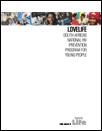loveLife: Reports and Publications
![]() The loveLife initiative is a bold and ambitious attempt to reduce HIV infection among South African adolescents by promoting sexual health and healthy futures for young people.
The loveLife initiative is a bold and ambitious attempt to reduce HIV infection among South African adolescents by promoting sexual health and healthy futures for young people.
loveLife Brochure (pdf.)
“loveLife’s for us…”: A survey of South Africa Youth 2001
Looking at loveLife: The First Year
Summaries of Monitoring and Evaluation
Hot Prospects, Cold Facts: National Survey of South African Youth
The Impending Catastrophe: A Resource Book on the Emerging HIV/AIDS Epidemic in South Africa
Executive Summary
Full Report
Former Presidents Clinton and Mandela Appeal for Increased Effort to Combat HIV Infection Among Young People
Two of the world’s most prominent elder statesmen have made a joint appearance in support of loveLife, South Africa’s national HIV prevention program for youth, hailing loveLife as the model for HIV prevention among youth globally. — more
“Behavior Change: The Cornerstone of HIV Prevention,” a Paper from loveLife, by David Harrison
Evidence that HIV prevention really works stems largely from cost-effective interventions implemented in countries with concentrated epidemics, or within high-risk populations in countries with generalized HIV epidemics. The few countries in which generalized epidemics have been substantially curtailed have helped explain the relative impact of behavioural mediators of HIV reduction that, in turn has finessed epidemiological modeling of successful intervention. This limited experience suggests that adequately resourced, politically supported national HIV prevention programs can change the course of the global HIV epidemic by averting millions of infections. Further, the benefits of such intervention are likely to outweigh costs by far. Still, the compelling question for countries experiencing a generalized epidemic is: What constitutes an effective national HIV prevention program?
loveLife is an example of a national HIV prevention program implemented in a country experiencing a generalized epidemic. To a large extent, the political economy in which loveLife operates is conducive to its success. For this reason, it serves as an important case study for HIV prevention.
Full report (pdf.)
